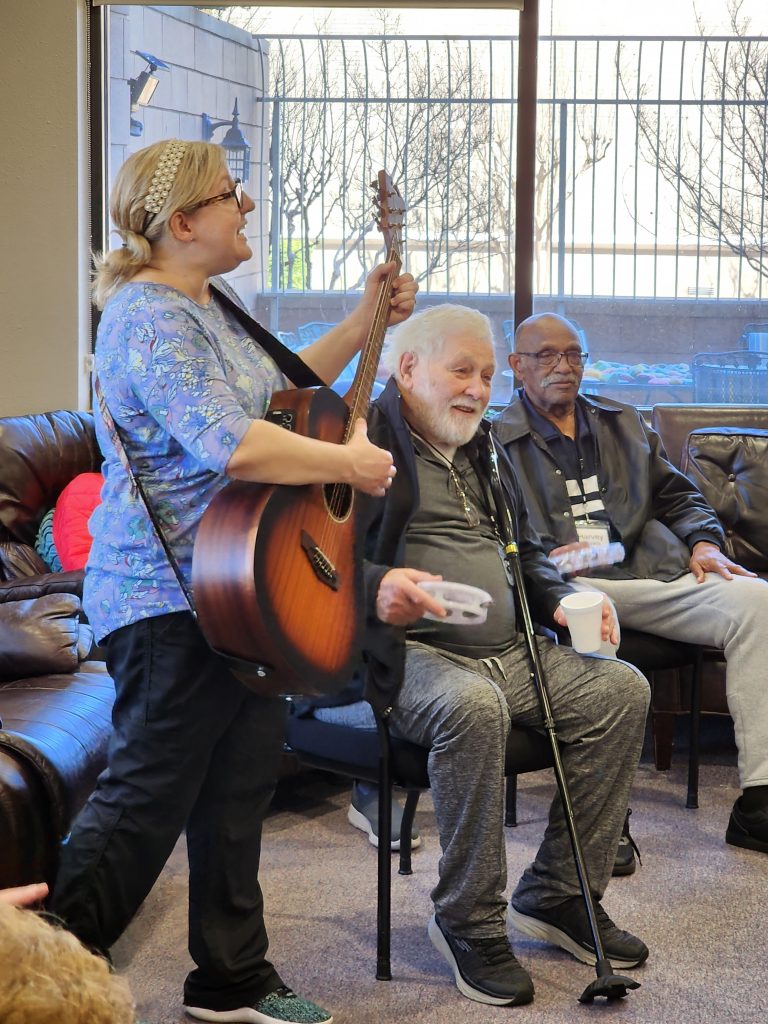Five Reasons to Choose A Senior Day Program
Senior Day programs are an affordable option in dementia care, offering support for the caregiver and delaying admission to long-term care for those with dementia.

“One in nine people aged 65 and older are living with Alzheimer’s disease or other related dementias, and 80 percent are receiving care in their homes provided by informal caregivers,” said Heather Macchietto, director of the James L. West Center for Dementia Care Senior Day Program.
James L. West’s Senior Day Program specializes in providing care to individuals in the early to middle stages of dementia. As a licensed adult day care center through the state of Texas, the program offers peace of mind for caregivers caring at home for a loved one who can no longer be left alone.

Photo courtesy of James L. West
“The day program allows people who would love to care for their loved one at home, keep them at home with them, but have some time of their own during the day,” said Dr. Cheryl Harding, PhD, president and CEO at James L. West.
Individuals in the early to middle stages of dementia who should not be left home alone are good candidates for the Senior Day Program.
With the holidays approaching, holiday preparations add more activities to already busy schedules for caregivers. A senior day program can provide important support for caregivers as they navigate the hustle and bustle of the season.
“All of our participants are older adults who have dementia,” Macchietto said. “We’re not trying to take the place of a nursing home, but to fill in the gap between diagnosis and full-time nursing care.”
Macchietto said families often question whether their loved one needs to be in a day program.
“If you’re calling me, if you’re searching for help, it’s because you already know you need some help,” she said.

Photo courtesy of James L. West
Here are five reasons to choose a senior day program:
- Physical health
The primary reason caregivers seek out day programs is their loved one’s physical safety. Most often, the individual can no longer safely prepare meals, and may forget to warm up or eat a meal prepared ahead of time for them.
The individual may need assistance with activities of daily living (ADLs) such as fastening or unfastening a belt before or after using the restroom, dressing, dressing appropriately for the weather, getting shoes on the right feet, or assistance with toileting.
While day programs don’t provide skilled nursing care, they can monitor vitals and administer medications with a doctor’s order. They also provide families with another set of eyes trained to notice symptoms or changes that family members may not notice.
2. Mental and emotional health
Senior day programs aren’t just for the participants. Caregivers experience many benefits as well. Peace of mind tops the list as caregivers can rest easy that their loved one is being well cared for.
“That support for the caregiver is so important,” Harding said. “The wonderful thing about the day program is that it really is an as you need it kind of program.”
Those caring for individuals living with Alzheimer’s disease or another form of dementia are at greater risk for anxiety and depression and have a lower quality of life due to isolation.
Senior day program participation also improves mental health for the participants. Because the participant and the caregiver are both more active physically and socially, they may experience a reduction in anxiety or depression. Participants often sleep better at the end of the day, allowing the caregiver to get more sleep as well.
3. Socialization
Participating in a day program, where they experience cognitive stimulation, seated and physical activities and social interactions can help participants maintain those abilities for longer.
“We really work hard every day to highlight their abilities, help them to be engaged with people like themselves and just have joy every day,” Harding said.
Meal time is especially important. Macchietto said the team works to make mealtime an occasion, encouraging participants to visit with each other and team members while enjoying the meal. Social eating also contributes to better nutrition.
4. Engagement
The senior day program routine, designed to follow typical patterns of movement, social interaction and physical activity, provides stability and familiarity for participants.
“We want them to go home at the end of the day, tired from being engaged all day and satisfied that they served a purpose every day,” Harding said.
Participants socialize with one another, complete purposeful tasks and activities and make decisions for themselves. Through getting to know each day program participant, the activity team plans and adapts activities to the interests and abilities of the participants.
5. Affordability
Compared to in-home or residential care, senior day programs offer an affordable daily rate for care. Participants can come from one to five days a week.
Senior day services are typically private pay and are less expensive than in-home care. Some long-term care insurance policies may reimburse policyholders for the service, and if the participant is a veteran or on Medicaid, benefits may also be available.

Photo courtesy of James L. West
Experience the James L. West Senior Day Program
Families are encouraged to check out the Senior Day Program and bring their loved one to experience the activities and programming and meet the staff.
“We welcome families to visit and see what it’s like,” Macchietto said. “It’s never too early to start having honest conversations about your loved one’s needs.”
The James L. West Center for Dementia Care offers dementia education, caregiver support groups, the senior day program, specialized short-term rehabilitation, residential care and overnight respite care. Visit www.JamesLWest.org to learn more, or call 877-817-1199 to schedule a visit and experience the senior day program for yourself.


 Sign in
Sign in

